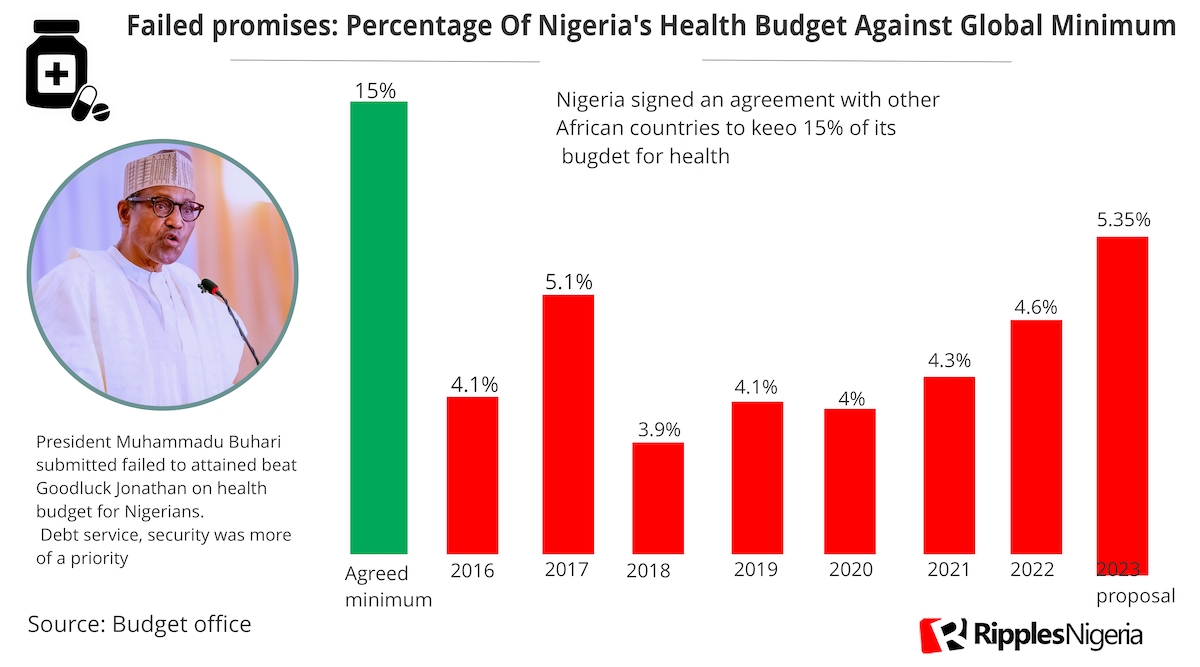Ripples Metrics
RipplesMetrics: President Buhari budgets N5,039 per citizen for medical care in 2023

In April 2001 at Abuja, Heads of State and government of the African Union (AU), including the then President Olusegun Obasanjo, signed and made a commitment to allocate 15 percent of their annual budget to improve the health sector.
This vow, later known as the Abuja Declaration, was greeted with global applause, optimism that Nigeria, along with other African countries, would finally take citizens’ health more seriously.
Twenty-three years (23 years) later, according to data from World Health Organisation, Ethiopia, Gambia, Malawi, Rwanda and South Africa have all already implemented the agreement of 15% health budget target.
Nigeria on its part is still nowhere near the promise it signed, and definitely not in 2023 again.
According to details from the N20.51 trillion budget proposed by President Muhammadu Buhari for 2023, N1.09 trillion is allocated to the ministry of health.
While the 2023 budget allocation is a 51.4 percent increase over the N724.92 billion allocated in 2022, it is still only 5.35 percent of the total budget.
The 5.35% allocation of the total 2023 budget is 9.65 percent lower than the 15 percent commitment signed.
President Buhari’s promises to Nigerians
In his presentation to the joint National Assembly session, President Buhari promised that critical health projects will be carried out in 2022.
According to him, the government intends to focus attention on equipping existing hospitals and rehabilitating infrastructure.
He added that emphasis would also be on local production of basic medicines/vaccines.
“Over the last year, this administration has implemented several priority projects especially health projects such as upgrading Primary Health Care centers across the six geopolitical zones,” he stated.
Budget per citizens
If the N1.09 trillion budget proposed by the President for ministry of health is approved, using the country’s estimated 217 million, according to data from Worldometer for the the coming year, the cost of medical care budgeted for each Nigerian is N5,039.
While this represents an increase from N3,453 in 2022 and N2,749 in 2021, the budget for citizens is grossly inadequate.
Aso Rock (State House), Nigeria’s seat of power, has planned for 2023 to buy drugs & medical supplies worth N65.287,354 (N65 million), as well as another N21.3 million on medical expenses (N21,321,160).
What health service can N5,039 buy?
Let’s take an endemic illness like malaria, endemic because malaria accounts for 60% of all clinic attendance in Nigeria, as case study.
The average cost of seeing a doctor in small clinics is N1,000 naira, the cost of a malaria test is also about N1,000.
The cost of drug treatment for uncomplicated malaria is between N1,500 and N2,000. Not counting additional drugs like paracetamol, the average cost of treatment for uncomplicated malaria in a local clinic exceeds the budgetary allocation for each Nigerian. The cost goes way up for complicated malaria diagnoses that require hospitalisation, injections and intravenous medication.
The average cost for basic antenatal care, which includes periodic visits to see obstetric nurses during which routine tests are carried out, is between N25,000 to N35,000 in government institutions.
This cost does not include ultrasounds which are as high as N8,000, and seeing consultants as may be required as pregnancy progresses.
Join the conversation
Support Ripples Nigeria, hold up solutions journalism
Balanced, fearless journalism driven by data comes at huge financial costs.
As a media platform, we hold leadership accountable and will not trade the right to press freedom and free speech for a piece of cake.
If you like what we do, and are ready to uphold solutions journalism, kindly donate to the Ripples Nigeria cause.
Your support would help to ensure that citizens and institutions continue to have free access to credible and reliable information for societal development.





















